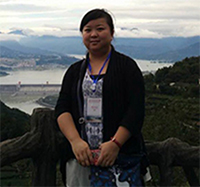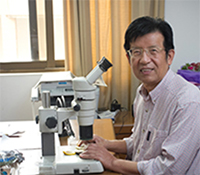 Michel Schmidt. Yunnan Key Laboratory for Palaeobiology, Yunnan University, North Cuihu Road 2, Kunming 650091, People’s Republic of China and MEC International Joint Laboratory for Palaeobiology and Palaeoenvironment, Yunnan University, 2 North Cuihu Road, Kunming 650091, People’s Republic of China and and Ludwig-Maximilians-Universität München, Biocenter, Großhaderner Str. 2, 82152 Planegg-Martiensried, Germany and MEC International Joint Laboratory for Palaeobiology and Palaeoenvironment, Yunnan University, 2 North Cuihu Road, Kunming 650091, People’s Republic of China. michel.m.schmidt@outlook.com
Michel Schmidt. Yunnan Key Laboratory for Palaeobiology, Yunnan University, North Cuihu Road 2, Kunming 650091, People’s Republic of China and MEC International Joint Laboratory for Palaeobiology and Palaeoenvironment, Yunnan University, 2 North Cuihu Road, Kunming 650091, People’s Republic of China and and Ludwig-Maximilians-Universität München, Biocenter, Großhaderner Str. 2, 82152 Planegg-Martiensried, Germany and MEC International Joint Laboratory for Palaeobiology and Palaeoenvironment, Yunnan University, 2 North Cuihu Road, Kunming 650091, People’s Republic of China. michel.m.schmidt@outlook.com
Michel Schmidt holds a Master of Science degree in Organismic Biology and Evolution from the Humboldt University Berlin, as well as another Master of Science degree in Marine Biology from the University of Rostock. He received his PhD [magna cum laude] from the Ludwig-Maximilians-University Munich. He is focusing on two major projects: The morphology and biodiversity of early Cambrian (518) euarthropods from the famous Chengjiang Lagerstätte of South China. And the functional morphology (3D kinematic modeling) of the prosomal appendages of early Palaeozoic (Ordovician-Devonian) sea scorpions (Eurypterida).
![]()
 Roland R. Melzer. MEC International Joint Laboratory for Palaeobiology and Palaeoenvironment, Yunnan University, 2 North Cuihu Road, Kunming 650091, People’s Republic of China and Bavarian State Collection of Zoology, Bavarian Natural History Collections, Münchhausenstr. 21, 81247 Munich, Germany and Ludwig-Maximilians-Universität München, Biocenter, Großhaderner Str. 2, 82152 Planegg-Martiensried, Germany and GeoBio-Center, Ludwig-Maximilians-Universität München, Luisenstr. 37, 80333 Munich, Germany. melzer@snsb.de
Roland R. Melzer. MEC International Joint Laboratory for Palaeobiology and Palaeoenvironment, Yunnan University, 2 North Cuihu Road, Kunming 650091, People’s Republic of China and Bavarian State Collection of Zoology, Bavarian Natural History Collections, Münchhausenstr. 21, 81247 Munich, Germany and Ludwig-Maximilians-Universität München, Biocenter, Großhaderner Str. 2, 82152 Planegg-Martiensried, Germany and GeoBio-Center, Ludwig-Maximilians-Universität München, Luisenstr. 37, 80333 Munich, Germany. melzer@snsb.de
Roland Melzer studied at the University of Freiburg and did his PostDoc at the University of Vienna. He is apl. Prof. at the Ludwig-Maximilians-University Munich and Curator of the section Arthropoda varia at the Bavarian State Collection of Zoology. His main research focus on all aspects of morphology, phlyogeny and evolutionary biology of arthropods as well as marine zoology.
![]()
 Huijuan Mai. Yunnan Key Laboratory for Palaeobiology, Yunnan University, North Cuihu Road 2, Kunming 650091, People’s Republic of China and MEC International Joint Laboratory for Palaeobiology and Palaeoenvironment, Yunnan University, 2 North Cuihu Road, Kunming 650091, People’s Republic of China. Huijuan.Mai@ynu.edu.c
Huijuan Mai. Yunnan Key Laboratory for Palaeobiology, Yunnan University, North Cuihu Road 2, Kunming 650091, People’s Republic of China and MEC International Joint Laboratory for Palaeobiology and Palaeoenvironment, Yunnan University, 2 North Cuihu Road, Kunming 650091, People’s Republic of China. Huijuan.Mai@ynu.edu.c
Huijuan Mai graduated from Peking University with a bachelor's degree and received a Ph.D. degree from the Institute of Vertebrate Palaeontology and Palaeoanthropology, Chinese Academy of Sciences. Her main research is on Archaeometry, which analyzes archaeological remains with various techniques. She carried out postdoctoral research in the Yunnan Key Laboratory for Palaeobiology of Yunnan University during 2017‒2019, mainly focusing on proteomics research in fossils. In addition, she is in charge of the operation of micro-CT (Zeiss Xradia 520 Versa). Huijuan explores the relationship between fossil preservation types and imaging effects based on micro-CT technology, and participates in the research of arthropods in the Chengjiang biota.
![]()
 Xianguang Hou. Yunnan Key Laboratory for Palaeobiology, Institute of Palaeontology, Yunnan University, 650500 Kunming, Yunnan, China and MEC International Joint Laboratory for Palaeobiology and Palaeoenvironment, Yunnan University, 650500 Kunming, Yunnan, China. xghou@ynu.edu.cn
Xianguang Hou. Yunnan Key Laboratory for Palaeobiology, Institute of Palaeontology, Yunnan University, 650500 Kunming, Yunnan, China and MEC International Joint Laboratory for Palaeobiology and Palaeoenvironment, Yunnan University, 650500 Kunming, Yunnan, China. xghou@ynu.edu.cn
X.G. Hou was graduated from the Department of Earth Sciences of Nanjing University, studying stratigraphy and palaeontology at the Department, received his MSc from Nanjing Institute of Geology and Palaeontology, Chinese Academy of Sciences and PhD from the Department of Palaeontology, Uppsala University, Sweden. While making investigation into Lower Cambrian bradoriids in Yunnan Province in 1984, he discovered the Chengjiang Lagerstätte on July 1st 1984 from the Lower Cambrian Qiongzhusi Formation at Maotian Hill of Chengjiang County, Yunnan Province. It gives him the first time to study the variability of the earliest Phanerozoic animals and their construction close to or at the very roots of metazoan phyla. Since then he has been working on it wholeheartedly. From 1990 he mainly did his research work in collaborations with Jan Bergström at the Department of Palaeozoology, Swedish Museum of Natural History in Stockholm, David J. Siveter, Richard J. Aldridge and Mark Williams at the Department of Geology, University of Leicester and Derek J. Siveter at the Department of Earth Sciences, University of Oxford. He transferred to Yunnan University from the Nanjing Institute of Geology and Palaeontology in 2000, was the former Director of Yunnan Key Laboratory for Palaeobiology, Yunnan University and retired from the University in 2019.
![]()
 Yu Liu. Yunnan Key Laboratory for Palaeobiology, Yunnan University, North Cuihu Road 2, Kunming 650091, People’s Republic of China and MEC International Joint Laboratory for Palaeobiology and Palaeoenvironment, Yunnan University, 2 North Cuihu Road, Kunming 650091, People’s Republic of China. (Corresponding author) Yu.liu@ynu.edu.cn
Yu Liu. Yunnan Key Laboratory for Palaeobiology, Yunnan University, North Cuihu Road 2, Kunming 650091, People’s Republic of China and MEC International Joint Laboratory for Palaeobiology and Palaeoenvironment, Yunnan University, 2 North Cuihu Road, Kunming 650091, People’s Republic of China. (Corresponding author) Yu.liu@ynu.edu.cn
Yu Liu is a Research Professor in Palaeobiology and Deputy Director of the Yunnan Key Laboratory of Palaeobiology in Kunming. He received his PhD (magna cum laude) in Natural Science from the University of Ulm, Germany. His work focuses on arthropods from the Chengjiang (Series 2, Stage 3) Konservat-Lagerstätte.

